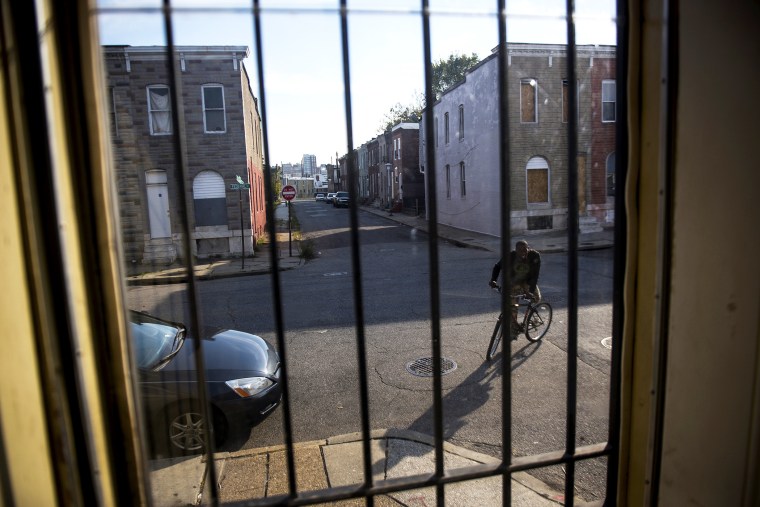City leaders in Baltimore will be rolling out one of the toughest curfew laws in the country on Friday night. The effort, which is aimed at keeping kids safe during dangerous late night hours, has drawn criticism from some parents and civil liberties groups.
Baltimore’s 20-year-old curfew law was recently amended, and it now requires unsupervised children younger than 14 to be off the streets by 9 p.m. Unsupervised teens between the ages of 14 and 16 must be indoors one hour earlier than in the past — by 10 p.m. on school nights and 11 p.m. during the summer and on weekends.
"The City Council put in a bill to update the law to make sure that a 5-year-old and a 14-year-old, or a 5-year-old and a 16-year old, didn't have the same curfew. And we also took away the penalty of jail for parents," said Mayor Stephanie Rawlings-Blake in an interview with MSNBC’s Alex Witt.
Curfew breakers will be taken to one of two curfew centers until a parent, who could be fined up to $500, can retrieve them. For now, the centers will only be open on Fridays and Saturdays, though the city says the centers will soon be open 24 hours a day and throughout the week.
“We want to take them off the streets so that we can decrease the chances of them being victims or perpetrators of criminal activity,” Caron Brace, a spokeswoman for the city, told msnbc. While violence in the city is down 20% and crime is down 10% so far this year, Baltimore remains one of the most dangerous places in the country.
Some parents have expressed concern that the earlier hours will be difficult for parents who work late to maintain and that the hours might overlap with legitimate extracurricular activities. There has also been long distrust of city police officers, and others have said they worry that the curfew could exacerbate an already frayed relationship between the police and many in the community.
“The really fundamental concern is that, of course we all want young people to be safe, but our concern is there are more effective ways to do that than by putting every child in Baltimore city on virtual house arrest and enforcing that with law enforcement,” said Sonia Kumar, a staff attorney with the American Civil Liberties Union of Maryland.
Kumar said that part of the curfew law also extended the daytime hours under restriction, bolstering the city’s truancy law to include school-time hours. “Part of where our concerns arise is that police officers will now have the power to stop people for just being outside,” Kumar said.
In a letter to Rawlings-Blake and Police Commissioner Anthony W. Batts, the ACLU sought clarification on the city’s plans to enforce the newly expanded curfew. The group questioned where youth would be taken during the week before the curfew centers are open 24 hours a day, what would happen to young people who don’t have IDs, and how police would respond to unsupervised children who don’t cooperate or who run from police.
A Baltimore police spokesman, Acting Capt. Eric Kowalczyk, told The Baltimore Sun that the department would be distributing training material to officers, as well as lists of resources for parents and families.
"We've been enforcing the curfew for 20 years, so as far as the enforcement angle, nothing is changing from our perspective other than the new hours and new resources," Kowalczyk told the paper. "This is about making sure we are identifying kids in at-risk situations and connecting them to city services." He added that officers who finds a child out after curfew could take the child (free of handcuffs) home or to a curfew center if the home seems unsafe.
“This is about connecting vulnerable kids and their families with resources. This is not about criminalizing kids,” Rawlings-Blake said. “For me this is about making sure they don’t wind up in the criminal justice system … I can’t afford to do nothing. The same people that argue with me that we need more services during the daytime want me to turn a blind eye at kids in need at night and I’m not going to do it.”
According to the city, the curfew centers, so-called Youth Connection Centers, will be staffed by employees and volunteers. During the daytime hours, the centers operate as traditional community centers with typical activities for children. At night, the centers turn into curfew centers, a practice established in 2008.
Brace, the city spokeswoman, said the centers during curfew hours will not be punitive.
“There’s no baby jail set up,” she said. “They are not in time out. They are not in trouble. We are getting them off the streets and out of harm’s way.”
Rawlings-Blake said by not doing all it could to keep children safe and off the streets, the city would be enabling the neglect of the city’s youngest and often it’s most vulnerable residents. “There’s this notion that if you are poor and your parent is struggling that those children shouldn’t be loved and cared for, that they shouldn’t have supervision and that’s ludicrous,” the mayor said. “We need to say enough is enough as a community and say that we are going to protect our kids.”
